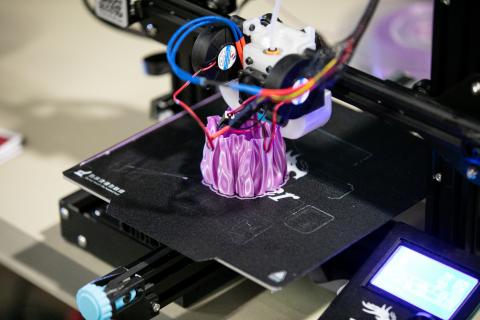University of Denver: First University in the Country to House a Plastic Recycling Machine
As a school committed to sustainability and the common good, the University of Denver (DU) is making strides to be the first university in Colorado—and the country—to house an industrial plastic recycling machine. This accomplishment is directly in line with the Ritchie School of Engineering & Computer Science’s Strategic Plan “to Create a Smart, and Sustainable world.” This machine will have huge implications on the campus, as well as the greater Denver area.
To fund the purchase of this machine and build up the new space for it Isaiah Silva, operations manager, in collaboration with Associate Professor and Executive Director of the Innovation Labs Michael Caston, applied for an Undergraduate Student Government Sustainability Grant. These grants are awarded by the Undergraduate Student Government Sustainability Committee to students with ideas on how to make campus more sustainable. The Ritchie School is planning to establish a new “Plastics Lab” within the Innovations Lab that will be open to the whole DU community.
The recycling machine can recycle thermoplastics, which can theoretically heat up and reform an infinite amount of times while maintaining their material properties, as opposed to thermoset plastics which heat up and “set” and can’t be reused again. Thermoset plastics typically aren’t even recyclable in the first place and if they are they have to undergo chemical processing in order to be recycled. According to Silva, roughly 300 pounds of plastic waste at DU can be utilized now with the plastic recycling machine and made into new materials to be used in the 3D printer because most of the plastics used for the 3D printer are thermoplastics. With this new machine, almost everything made with the 3D printer in the Innovation Labs can be recycled through the recycling machine at some point and made into new material for the 3D printer. By using this recycling machine this will produce less waste and more reusable materials for the DU community.
Beginning initially at the Ritchie School, Silva plans to eventually expand this plastic recycling to the rest of campus once the infrastructure of the machine has been secured. The Ritchie School hopes to unite with the Center for Sustainability for the sorting of plastic for the machine—this partnership will create new jobs and student staff positions on campus.
Silva hopes this machine will motivate students to learn more about sustainable practices, “I think that it comes down to awareness…by creating cool products that will end up in the DU community one way or another, people are going to become interested. I think this will really motivate students to take charge in sustainability.”
This machine will be available to everyone in the DU community for free though they will be required to take a two-hour training course. After the required training access to the Plastics Lab will be unlimited. The goal for Silva is to create products with the Innovation Labs’ 3D printer that can be put back into campus, effectively creating a closed loop recycling system on campus. The machine could also help to naturally create partnerships between DU and other schools and businesses in the greater Denver community.
While DU is honored to be the first university in the country to house an industrial plastic machine, Silva said, “We need to learn how to deal with our resources properly, and these types of spaces are only going to become more prevalent around the country.” Silva is hoping to have the project completed by the end of this school year. The project was delayed last March due to the Coronavirus pandemic. The Innovation Labs also shifted its attention to making Personal Protective Equipment (PPE) such as masks and face shields for the DU community, so the Plastics Lab has taken a backseat in construction for the moment. Regardless, DU is on its way to becoming a sustainable campus and will set the precedent for schools around the country in plastic recycling and sustainability.



